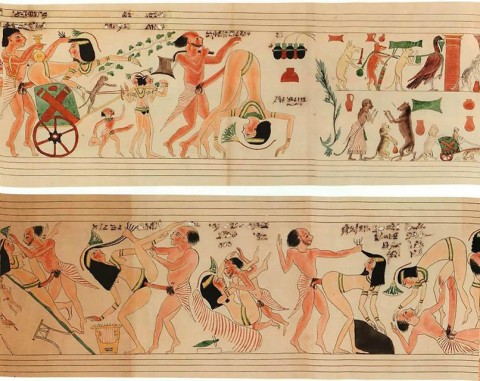When you think about Ancient Egypt, your mind probably goes straight to pyramids, pharaohs in gold masks, and mysterious hieroglyphs. But behind the temples and tombs, this civilization was full of very human stories desire, passion, jealousy, and everyday love lives that might surprise you. While their customs can seem exotic or even shocking now, the truth is that people along the Nile weren’t all that different from us. They just had their own ways of dealing with intimacy, relationships, and the messiness of human emotions.
Marriage in Ancient Egypt: Practical, Yet Personal
For the average Egyptian, marriage wasn’t about love at first sight or whirlwind romance. It was mostly practical focused on family stability, property, and social standing. Couples often married young, sometimes as teenagers, and the union was expected to keep households running smoothly.
But here’s the twist: even though marriage had a practical foundation, feelings still mattered. Ancient Egyptian love poems and carvings reveal that affection and attraction were highly valued. Husbands praised their wives’ beauty, women spoke fondly of their partners, and intimacy was not treated as something shameful.
Divorce, Lovers, and Jealousy
Unlike in many later societies, marriage in Egypt was not a permanent trap. If things didn’t work out, both men and women had the right to end the relationship. Women, in particular, enjoyed surprising independence they could leave their husband, keep their belongings, and remarry freely. In a way, this gave them more autonomy than women in some modern societies.
Of course, freedom also meant temptation. Affairs weren’t unusual, and jealousy left its mark in poems, myths, and even legal records. Love triangles, secret relationships, and broken promises? As timeless as humanity itself.
Fertility and the Pressure to Have Children
Children were considered a blessing and, in many ways, the ultimate goal of a relationship. Fertility was celebrated, protected, and even obsessed over. If a couple struggled to conceive, they might try a mix of remedies that blended medicine, superstition, and ritual.
-
Herbal concoctions were used as fertility boosters.
-
Amulets and charms shaped like gods or animals were worn to attract divine help.
-
Rituals and prayers were offered to fertility deities, especially Hathor and Min.
Some methods sound bizarre today like drinking unusual mixtures or performing symbolic acts meant to “open the womb.” But to the Egyptians, these practices were serious and sacred, proof of their desire for children.
When Medicine and Magic Collided
Ancient Egyptian medical papyri show how deeply they mixed science with spirituality. One fertility “test” involved inserting garlic or onions into a woman’s body overnight if the smell came out of her mouth, she was believed to be fertile. Strange? Definitely. But it shows how creatively they tried to make sense of reproduction.
Gods, Goddesses, and Divine Desire
In Egyptian mythology, love and sex weren’t just human experiences they were cosmic ones. The gods themselves were role models for passion, fertility, and even scandal.
-
Isis and Osiris: their love story was one of devotion and rebirth.
-
Nut and Geb: sky and earth, whose union created life itself.
-
Sibling marriages among the gods were seen as divine examples, legitimizing the royal family’s similar practices.
By looking at myths, Egyptians gave themselves spiritual permission to explore intimacy. Desire wasn’t dirty it was divine.
Royals, Incest, and Palace Scandals
If regular Egyptians had practical marriages, the royal family played by an entirely different set of rules. Pharaohs often married their sisters or half-sisters to keep power within the bloodline. To modern eyes, that’s shocking. But back then, it was presented as a way to maintain dynastic purity and connect rulers to the gods, who themselves were believed to marry within the family.
Behind the grandeur of royal ceremonies, palaces were buzzing with drama. Jealousy, betrayal, and whispered affairs were just as real in those golden halls as in any modern soap opera. Ancient scrolls and gossip etched in history prove one thing: even pharaohs couldn’t escape the chaos of passion.
The Art of Desire: Poetry, Music, and Imagery
Far from hiding intimacy, Egyptians often celebrated it openly. Love poems written on papyrus and pottery speak of longing glances, stolen kisses, and the thrill of secret meetings. Some verses are tender, others downright playful.
Here’s a translated line from a love song:
“With your sweet voice, you capture my heart. To hear you is like honey to my ears.”
Erotic imagery wasn’t uncommon either. Wall paintings, figurines, and even everyday objects sometimes carried sensual undertones. Far from being prudish, this society embraced beauty, attraction, and pleasure as natural parts of life.
Beauty, Perfumes, and Seduction
Makeup, perfumes, and oils weren’t just for fashion they played an intimate role in attraction. Women painted their eyes with kohl not only for beauty but also as a subtle tool of seduction. Perfumed oils were rubbed onto the skin, turning intimacy into a sensory ritual.
For Egyptians, grooming was linked to desire. A well-kept body and a pleasant fragrance were just as important as charm or conversation. In a sense, they understood the art of seduction in ways that still feel familiar today.
Contraception and Intimate Health
Interestingly, Egyptians also explored ways to avoid pregnancy. Some ancient papyri describe contraceptive methods that combined natural ingredients with creative thinking. Honey, crocodile dung (yes, really), and linen soaked in certain mixtures were used as barriers or spermicides.
While we may cringe at some of these practices, they highlight an important truth: Egyptians didn’t treat intimacy as a taboo subject. They experimented, documented, and openly discussed ways to control fertility. That openness set them apart from many later cultures.
Jealousy, Passion, and Everyday Life
It’s easy to get caught up in the strange or scandalous, but what’s most striking is how relatable the Egyptians were. Couples fought, lovers envied one another, and passion drove people to do reckless things. For every royal incest story, there were countless ordinary relationships filled with affection, frustration, and desire.
The intimacy of Ancient Egypt reminds us that behind the monuments and hieroglyphs, these were real people. They worried about fertility, celebrated beauty, and dreamed about passion just as we do today.
Why Their Stories Still Matter
So why dig into the intimate lives of people who lived thousands of years ago? Because it reminds us that human nature doesn’t change. The setting might be different a palace on the Nile instead of a city apartment but the emotions are the same.
Love, lust, jealousy, heartbreak, and the search for connection are timeless. Ancient Egyptians just wrapped those feelings in rituals, myths, and practices that suited their world. By studying them, we not only learn about history we learn about ourselves.













